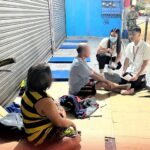The Department of Social Welfare and Development (DSWD), as the lead agency in social protection, continues to provide comprehensive programs to support both victim-survivors and perpetrators of gender-based violence (GBV), ensuring a holistic approach to prevention, response, and reintegration, the agency spokesperson said on Wednesday (April 2).
DSWD spokesperson Assistant Secretary Irene Dumlao said the agency implements the Comprehensive Intervention Against Gender-Based Violence (CIAGV) which aims to reduce vulnerability among women, men, girls, and boys by improving access to quality response and reintegration services while promoting active participation in violence prevention initiatives.
“With the need to reduce incidence of gender-based violence, in both normal and emergency/ crisis situations, the CIAGV is a holistic framework designed to prevent, address, and reintegrate individuals affected by GBV,” Asst. Secretary Dumlao said.
The CIAGV program has three components: prevention, response, and reintegration.
Under prevention, the program aims to increase the awareness of the general public and vulnerable groups on the knowledge and perception of GBV as well as strategies to combat it.
“The response component focuses on enhancement of service delivery systems to survivors through specialized training, improvement of centers and establishment of women-friendly centers during crisis situations,” the DSWD spokesperson said.
The last component, reintegration, is the provision of services to support the healing, rebuilding of lives, and smooth transition and return of victim-survivors to their communities.
Recognizing that addressing GBV also requires interventions for perpetrators, the DSWD has introduced the Counseling Services for Rehabilitation of Perpetrators of Domestic Violence (CSRPDV)—a community-based intervention aimed at rehabilitating men who have committed domestic violence.
“The program aims to help perpetrators understand the root causes of their violent behavior; shift their perspectives and behavior to prevent future acts of violence; and provide training for community program facilitators to equip them with the necessary knowledge and skills to rehabilitate perpetrators,” Asst. Secretary Dumlao explained.
According to the DSWD spokesperson, the CSRPDV is specifically designed for men who have committed acts of domestic violence but whose cases have not yet been filed in court.
“Through these programs, the DSWD reaffirms its commitment to building safer communities by providing comprehensive support to both victim-survivors and perpetrators of gender-based violence,” Asst. Secretary Dumlao said.
Gender-based violence is an umbrella term for any harmful act that is perpetrated against a person’s will and that is based on socially ascribed differences between males and females. It is a life-threatening protection issue among women and children. (YADP)


